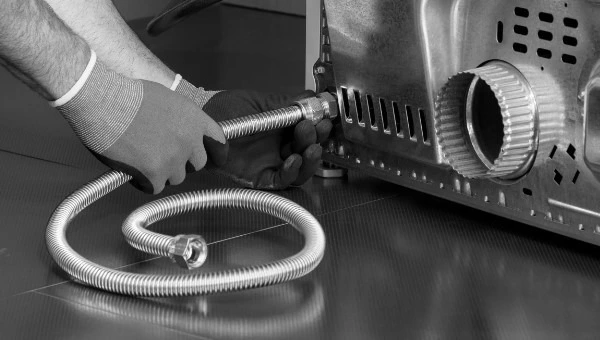When it comes to selecting a dryer for your home, the type of energy it uses is a crucial decision point. Electric and gas dryers are the two predominant choices on the market, each with its own set of benefits and drawbacks. However, in recent years, the conversation around sustainability and energy efficiency has brought the gas dryer, and by extension the gas line for dryer, into the spotlight.
In this comprehensive guide, we’ll delve into the advantages of choosing a gas dryer, what it entails to install a gas line, the cost factors, maintenance, safety, and the environmental impact of opting for gas over electricity. Let’s explore why a gas line for a dryer might just be the better option for your laundry needs.
Table of Contents
The Advantages of Choosing a Gas Dryer
Gas dryers offer several distinct advantages over their electric counterparts that can make them a superior choice for many households. One of the most significant benefits is their operational efficiency. Gas dryers can reach the required drying temperatures more quickly than electric dryers, which means they can dry clothes in a shorter amount of time. This efficiency is not only a boon for busy families looking to save time on laundry but also translates into lower energy usage and, consequently, savings on utility bills.
In terms of cost-effectiveness, the use of natural gas as a fuel source generally results in lower operational costs when compared to the electricity consumption of electric dryers. Given the fluctuating costs of energy, the ability to utilize a cheaper fuel source can contribute to substantial savings over the lifetime of the appliance.
Another often-overlooked advantage of gas dryers is their potential for a more gentle drying process. The moisture sensor in many gas dryers can more accurately determine when clothes are dry and stop the cycle, reducing the risk of over-drying. This careful handling can help maintain the integrity and longevity of fabrics, keeping your favorite clothes in wearable condition for longer.
Furthermore, the preference for gas dryers among some users is rooted in the quality of drying. Many report that gas dryers leave clothes feeling softer and less staticky compared to electric dryers. This difference in drying quality, combined with the efficiency, cost savings, and fabric preservation, makes gas dryers an attractive option for households prioritizing convenience, sustainability, and garment care.
Understanding the Basics of a Gas Line Installation
Before embarking on the journey to install a gas line for your dryer, it’s essential to grasp the foundational aspects of what this process entails. Initially, confirming the presence of a natural gas supply to your home is a critical step. Without access to natural gas, the option for a gas dryer becomes moot.
Following this, the selection of a qualified professional for the installation cannot be overstated. This task demands expertise due to the intricacies involved in selecting the appropriate type of gas piping, determining the correct sizing for your specific setup, and making secure connections to eliminate any risk of leaks.
Equally important is the adherence to local building codes and regulations. These rules can vary significantly from one jurisdiction to another and are in place to ensure the safety and efficacy of your gas line installation. They may dictate the materials to be used, the method of installation, and even the qualifications of the person allowed to perform the installation. Ignoring these regulations can result in not only potential safety hazards but also legal issues.
Additionally, the process involves precise planning regarding the route the gas line will take from the source to the dryer. This planning must consider the most efficient and least obtrusive path, while also keeping in mind the necessity for future access for maintenance or inspection. By understanding these basic components of gas line installation, homeowners can better prepare for the task at hand, ensuring a safe and successful addition to their home’s utilities.
The Cost Factor: Investment vs. Long-Term Savings
Investing in a gas line for your dryer involves an initial financial commitment that may appear daunting at first glance. The installation process requires professional expertise, particularly if your residence is not already equipped with a natural gas supply, potentially adding to the expense. Yet, it’s imperative to view this expenditure not merely as a cost but as a strategic investment into your home’s utility infrastructure and efficiency.
The operational expenditure of gas dryers, fueled by natural gas, is typically lower than that of electric dryers, which rely on electricity – a form of energy that can be more expensive depending on your region’s energy market dynamics. This difference in energy cost can become significant over the lifespan of your dryer, gradually offsetting the initial setup cost. Additionally, the superior efficiency of gas dryers translates into quicker drying times, further reducing the operational expenses by consuming less energy per cycle.
It’s also worth considering the potential increase in your home’s market value following the installation of a gas line. Homes equipped with natural gas appliances are often more appealing to prospective buyers, who may value the efficiency and cost-effectiveness of gas over electricity. This enhancement to your home’s attractiveness can be seen as another form of return on your investment.
By understanding the broader financial picture, including the potential for long-term savings and increased home value, homeowners can make a more informed decision about the installation of a gas line for their dryer. This perspective helps in appreciating the full scope of benefits that come with choosing a gas dryer over an electric one.
Maintenance and Safety: Keeping Your Gas Line in Top Condition
Ensuring the safety and optimal functioning of your gas line and dryer setup requires diligent maintenance. Regular, professional inspections are a cornerstone of maintaining a safe environment for gas appliances in your home. These inspections should include checking for any signs of wear and tear on the gas line, as well as ensuring all connections are secure and leak-free.
A crucial aspect of gas line maintenance is familiarity with the signs of a potential gas leak. These can include a distinct sulfur-like smell (similar to rotten eggs), a hissing sound near gas lines, or visible damage to the gas pipeline. Knowing how to promptly respond to these signs—such as shutting off the gas supply if safely possible and immediately calling a professional—can prevent potentially hazardous situations.
Homeowners should also be proactive about scheduling routine maintenance checks. This doesn’t just involve a cursory look-over; it entails a comprehensive examination by a certified professional who can assess the system’s integrity and performance. They can detect minor issues before they escalate into major problems, ensuring that your gas dryer operates efficiently and safely.
Lastly, it’s important to have a carbon monoxide detector installed near your gas dryer. Carbon monoxide is a colorless, odorless gas that can be deadly if inhaled in large quantities. A detector provides an additional layer of safety, alerting you to any dangerous emissions from your gas dryer or line, reinforcing the safety of your household.
The Environmental Impact: A Greener Choice
Opting for a gas dryer, fueled by natural gas, presents an environmentally friendly alternative to electric dryers powered by the conventional electric grid, which often relies on coal or oil. Natural gas, as a fossil fuel, boasts a cleaner combustion process, emitting fewer pollutants and greenhouse gases than its coal or oil counterparts. This cleaner burning characteristic of natural gas translates into a more eco-conscious laundry solution, aligning with the growing trend towards sustainable living.
Moreover, the inherent efficiency of gas dryers plays a critical role in their environmental benefits. The quick drying times and reduced energy consumption associated with gas dryers mean that less energy is required per drying cycle. This efficiency not only contributes to lower operational costs but also to a reduction in overall energy demand.
In turn, this diminished energy requirement can lead to decreased reliance on fossil fuel-based power generation, contributing to a reduction in carbon emissions associated with your household’s laundry practices.
By considering a gas dryer for your home, you are making a decision that supports a more sustainable future. The shift towards gas-powered appliances like dryers is a step in the right direction for homeowners aiming to minimize their environmental footprint while still enjoying the conveniences of modern living. This choice reflects a mindful approach to household energy consumption, acknowledging the importance of sustainability in everyday activities.
Making the Switch: What Homeowners Need to Know
Embarking on the transition from an electric to a gas dryer involves several critical considerations. Firstly, it’s essential to verify if your residence has access to a natural gas supply, as this will determine the feasibility of installing a gas dryer. Understanding the initial costs involved in establishing a gas line is crucial, including the expenses related to professional installation services and any modifications your home might require to accommodate this change.
Beyond the upfront investment, homeowners should be mindful of the maintenance and safety protocols that come with having a gas dryer. Regular inspections by certified professionals will be key to ensuring the longevity and safe operation of your gas appliance. This includes being vigilant about the signs of gas leaks and understanding the necessary steps to mitigate risks immediately.
Furthermore, it’s beneficial to reflect on the environmental implications of your decision. Switching to a gas dryer aligns with efforts to reduce carbon footprints, thanks to the cleaner combustion of natural gas compared to electricity generated from fossil fuels. This decision not only impacts your household by providing efficiency and cost savings but also contributes positively to broader environmental sustainability efforts.
Lastly, weigh the long-term benefits against the initial setup costs. The efficiency and lower operating costs of gas dryers can offer significant savings over time, making this a wise investment for those looking to enhance their home’s utility and environmental footprint. Considering these factors will help you make a well-informed decision on whether making the switch to a gas dryer is the right move for your household.
FAQ’s About a Gas Line For a Dryer
What kind of pipe do you use for a gas dryer?
To prevent corrosion, it is recommended that the material be constructed of either yellow brass or flexible stainless steel tubing. In addition, professional plumbers are capable of examining other heating components within your home to prevent potential losses and secure your property.
How much is it to install a gas line for a gas dryer?
To properly budget for a gas dryer, it’s important to factor in both the average cost of $1,000 for the dryer itself as well as installation costs. Installation costs for a gas dryer typically range from $225 to $350, though keep in mind that if a new gas line is required, the installation costs may jump to a range of $1,500 to $2,000.
Is it safe to hook up your own gas dryer?
Undertaking the task of installation alone is feasible, provided you have the necessary hookups. However, prior to commencing the process, it is imperative to possess the written instructions that were provided along with the product and have the assistance of a second person to maneuver the cumbersome apparatus into position.
Conclusion
Clovis Plumbing Services sets itself apart from other competitors in the industry by offering affordable rates that are unparalleled. We firmly believe that providing high-quality plumbing services should not come with a steep price tag, which is why we put in the effort to ensure that our rates are reasonable. Our dedication to balancing cost and quality is a testament to our commitment to customer satisfaction. This unique combination enables homeowners to access top-notch plumbing services without having to spend a fortune.

